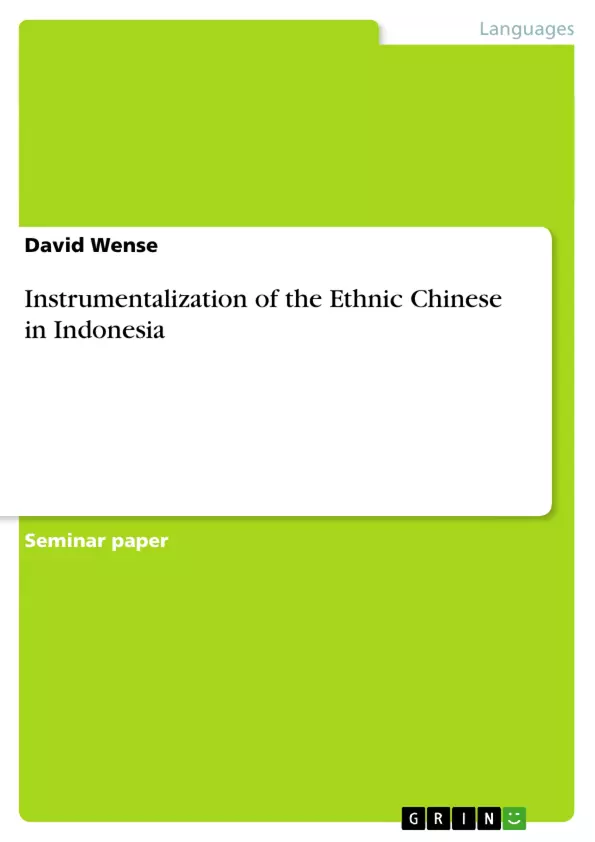This paper focuses the Chinese of Indonesia, that group that is assumed to dominate
the economy as well as to be unassimilable (Oetomo 1989). In the course of this essay, the follwing thesis will be examined: only because of the political and economic intrumentalization by the Dutch colonial government, the Chinese migrants became the so-called seperated “ethnic Chinese minority group”
and stayed in this condition as a result of the independent Indonesian state’s policy.
The first part of this paper presents an explanation of the term “migration” and
introduces an overview of migration research and the history of migration to South
East Asia. While the second part discusses the theoretical premisis of the construction of an ethnical minority, the third part reassess the drawn conclusion on the case of the Chinese in Indonesia.
A summary of the results are given in the conclusion.
Inhaltsverzeichnis (Table of Contents)
- Introduction
- Migration
- Definition of Migration
- History of Migration Research
- History of Chinese Migration to South-East Asia
- Relations between the Chinese State towards the Chinese emigrants
- History and Demography of Chinese Migration to Indonesia
- Theoretical Foundations
- Instrumentalization of the Chinese Minority in the Colonial and Independent Indonesian State
- The concept of ethnicity
- The definition of ethnic minority
- The meaning of ethnic conflicts
- Case Study
- The Colonial State and the Chinese Minority
- The Independent Indonesian State and the Chinese Minority
- Conclusion
Zielsetzung und Themenschwerpunkte (Objectives and Key Themes)
This paper examines the role of the Dutch colonial government in the "instrumentalization" of the Chinese community in Indonesia, leading to their categorization as a separate "ethnic Chinese minority group." The paper analyzes the lasting impact of this categorization on the Chinese community, even after Indonesia gained independence.- The historical and political context of Chinese migration to Indonesia
- The concept of "instrumentalization" as a means of constructing ethnic identity
- The role of colonialism in shaping the relationship between the Indonesian state and the Chinese minority
- The persistence of the "ethnic Chinese minority group" categorization in independent Indonesia
- The impact of this categorization on the Chinese community in Indonesia
Zusammenfassung der Kapitel (Chapter Summaries)
- Introduction: This chapter introduces the paper's focus on the Chinese community in Indonesia, particularly their perceived economic dominance and perceived unassimilability. It presents the main thesis: the Chinese migrants became a distinct "ethnic Chinese minority group" due to the political and economic instrumentalization by the Dutch colonial government, a categorization that persisted under the independent Indonesian state.
- Migration: This chapter defines the concept of migration, differentiating between internal and international migration, as well as temporary and permanent migration. It explores the historical development of migration research, highlighting the European interest in Chinese communities in South-East Asia and the lack of interest from China until the 20th century. The chapter discusses the shift in international migration research from a national framing to a transnational perspective.
Schlüsselwörter (Keywords)
This paper focuses on the history of Chinese migration to Indonesia, specifically exploring the concept of "instrumentalization" as a means of constructing ethnic identity, highlighting the role of colonialism and its impact on the relationship between the Indonesian state and the Chinese minority. Key terms and concepts include: migration, instrumentalization, ethnicity, ethnic minority, colonialism, and the Chinese in Indonesia.- Quote paper
- Bakk. phil. David Wense (Author), 2008, Instrumentalization of the Ethnic Chinese in Indonesia, Munich, GRIN Verlag, https://www.hausarbeiten.de/document/120982


